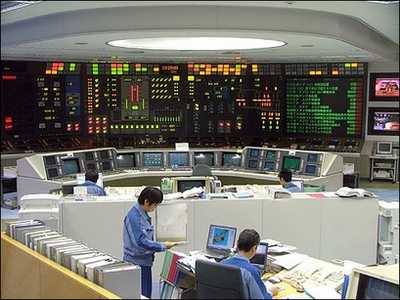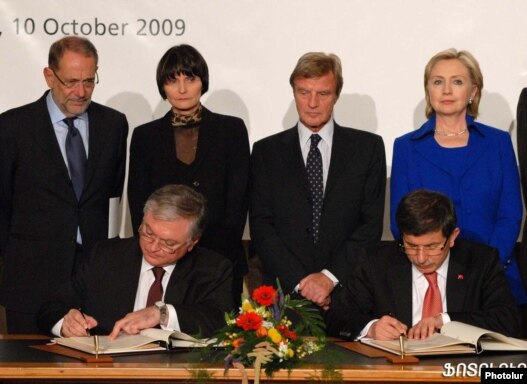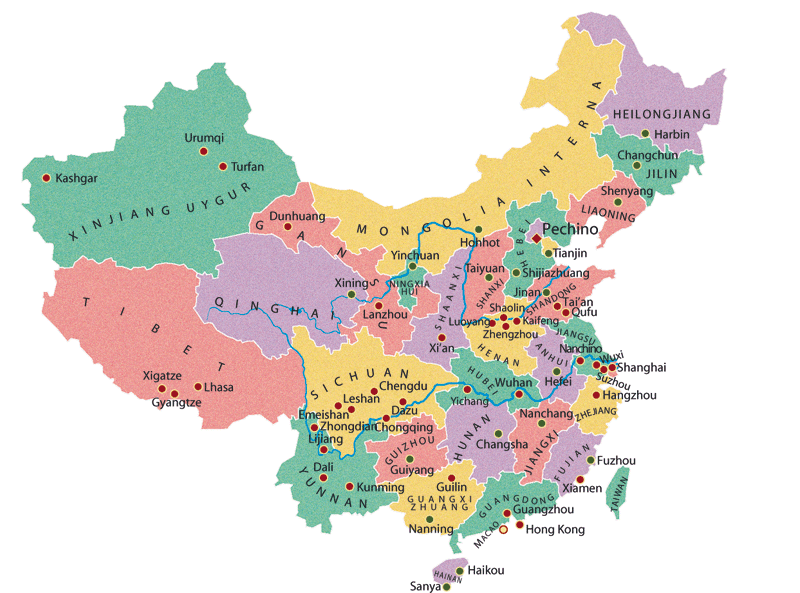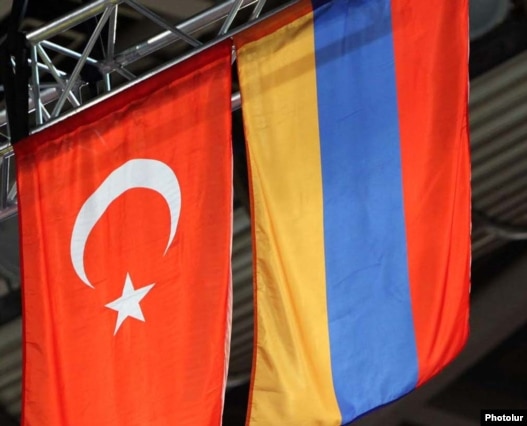One year ago, on October 10, 2009, Armenia and Turkey signed two protocols aimed at normalizing relations. The signing of what many political pundits termed a “historic” deal took place in Zurich, the culmination of painstaking diplomatic efforts by the two countries’ presidents and by international mediators, primarily Switzerland and the United States.
The Western-backed process began with Turkish President Abdullah Gul’s historic September 2008 visit to Yerevan, following an invitation by his Armenian counterpart, Serzh Sarkisian, to attend a soccer World Cup qualifier between the national teams of the two neighbors.
The two leaders watched the return leg of the match in the Turkish city of Bursa a year later, just four days after their foreign ministers, Edward Nalbandian and Ahmet Davutoglu, inked two protocols committing to the establishment of diplomatic relations and the opening of their borders soon after the documents were ratified in both countries’ parliaments.
But a year on, the future of the protocols remains unclear, as no parliamentary ratification of the documents has taken place in either country. Meanwhile, the cautious optimism surrounding the future of the deal, which faced domestic opposition in both countries, has fizzled out.
Turkey — President Abdullah Gul (R) with his Armenian counterpart Serzh Sarkisian at Turkey vs Armenia FIFA 2010 World Cup group match in Bursa, 14Oct2009
Official Yerevan and political majority leaders in Armenia had repeatedly stated the country’s strong readiness to complete the ratification of the protocols in the Armenian legislature, but only after Turkey made that step first.
But since the signing ceremony, senior officials in Turkey have sought to link ratification of the protocols with progress in a separate dispute between Armenia and Azerbaijan over the region of Nagorno-Karabakh. Yerevan responded by saying the protocols contained no conditions regarding that issue and that Ankara should, therefore, proceed with the ratification of the agreements unconditionally.
The diplomatic bickering eventually led to Sarkisian suspending the ratification process in the Armenian parliament last April. But he indicated that Yerevan was not, for now, withdrawing its signature from the documents – a statement welcomed by the international community, in particular by the United States and the European Union.
Views on the future of the protocols remain largely pessimistic at this moment – at least on the Armenian side. Alexander Arzumanian, a senior member of the opposition Armenian Pan-National Movement (HHSh), believes true normalization is not a priority for Turkey.
“Turkey used the protocols to solve its most important issue, as [due to these protocols] it has become a full player in this region and has gotten its own place in the negotiating format for a Karabakh settlement,” he said.
The opposition member, who served as Armenia’s foreign minister from 1996 to 1998, argued that Armenian authorities should not have launched the process the way they did, since Turkey, he claims, views all things within one package — that is, to make Armenia abandon its long-standing effort to gain international recognition of the World War I-era mass killings and deportations of Armenians in the Ottoman Empire as genocide, as well as to persuade Armenia to make concessions over Karabakh in favor of Turkey’s regional ally Azerbaijan.
The announcement of a road map for a Turkey-Armenia rapprochement in April 2009 made the Armenian Revolutionary Federation (Dashnaktsutyun) quit the governing coalition. Giro Manoyan, a foreign policy spokesman for the now opposition party, insists that Yerevan must move further toward withdrawing its signature, as the current process only benefits Turkey.
“I think the first anniversary [of the signing of the protocols] is a good occasion for Armenian authorities to withdraw their signature from the protocols,” Manoyan said, “considering the fact that Turkey has failed to show goodwill, and in reality is currently using the protocols for a different purpose than what they were meant for.”
Another opposition party, Heritage, which vehemently opposed the protocols from the outset, shares Dashnaktsutyun’s position. The leader of the Heritage party’s parliamentary faction, Stepan Safarian, says Armenia must withdraw its signature from the document considering the “constant speculations” from Turkey.
Armenian and Turkish flags
Armenia’s ruling party, meanwhile, thinks Armenia has benefited from the process in terms of “showing itself as a good partner” to the world.
“Armenia may consider the problems it has raised before itself in connection with the protocols solved, in the sense that the Armenian side has proved to the entire world that it is a good and constructive partner, that it seeks to solve problems with all neighbors peacefully, through negotiations, and is ready to start certain relations unconditionally,” says Republican Party of Armenia (HHK) lawmaker Karen Avakian. “This process needed to be started, and I think it was necessary to once again unmask Turkey, to make Turkey show its [true] face to the world.”
Avagian does not exclude that dialogue between Yerevan and Ankara may still continue “if Turkey shows constructive behavior.” “I think sooner or later Turkey will realize the gravity of these issues and will not take into consideration the Karabakh process,” Avagian added.
In a recent interview with the Austrian news magazine “Profil,” Armenian Foreign Minister Edward Nalbandian also gave an indication that Armenia does not consider the process of normalization with Turkey as having completely failed. “We hope that the process is not dead, but suspended,” he said.




 Foreign Ministers Eduard Nalbandian of Armenia (L) and Ahmet Davutoglu of Turkey sign landmark agreements to normalize Turkish-Armenian relations in Zurich.
Foreign Ministers Eduard Nalbandian of Armenia (L) and Ahmet Davutoglu of Turkey sign landmark agreements to normalize Turkish-Armenian relations in Zurich.





 Armenia — Turkish and Armenian flags fly alongside each other during an international sporting event in Yerevan, undated.
Armenia — Turkish and Armenian flags fly alongside each other during an international sporting event in Yerevan, undated.